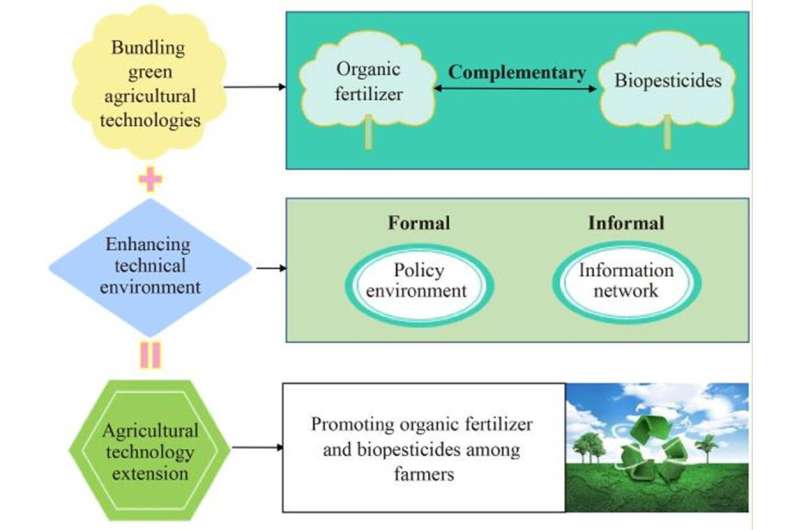This article has been reviewed according to Science X's editorial process and policies. Editors have highlighted the following attributes while ensuring the content's credibility:
fact-checked
proofread
Will the improvement of the technical environment help promote organic fertilizer and biopesticides among farmers?

China has scored consecutive good harvests for years running, but there has been a problem of agricultural production that emphasizes weight rather than quality. The main manifestation is the long-term and high-intensity use of land resources and the massive application of mineral fertilizers and pesticides to meet the demand for increased production.
This rough production method has induced a serious problem of agricultural surface pollution, which seriously restricts the sustainable development of Chinese agriculture. Promoting the transformation of agriculture to green development and achieving sustainable agricultural development has increasingly become a crucial part of China's agricultural supply-side structural reform.
As one of the green production technologies, the application of organic fertilizer and biopesticides can effectively replace mineral fertilizers and pesticides, and improve the quality, efficiency and competitiveness of green agricultural development. Despite the large potential, the current adoption of organic fertilizer and biopesticides among farmers is relatively low.
Good practice dictates that the promotion of technology is inseparable from the excellent attributes of the technology itself and the matching technical environment. The role of the technical environment is critical to the promotion of agricultural technology application. It is both a vital carrier for farmer technology adoption as well as a constraint, and guides farmer choices. It is imperative to investigate the influence of technical environment on farmers' organic fertilizer and biopesticides adoption behavior, but it has not been effectively explored.
Associate Professor Ting Meng from China Agricultural University, as well as her research teams, examined how technical environment influences farmers' adoption behavior of organic fertilizer and biopesticides in Heilongjiang Province, China.
Based on a survey of 1282 farmers, bivariate probit model was applied to comprehensively analyze the impact of technical environment on farmers' organic fertilizer and biopesticides adoption behavior and the potential for improvement, and further discussed the differences in the impact of technical environment on the technology adoption behavior among different groups of farmers.
To start with, the study found that farmers adoption of organic fertilizer and biopesticides was significantly and positively correlated. In addition, the study also showed that the technical environment had a significant positive effect on farmers' adoption of organic fertilizer and biopesticides.
Compared to farmers who have not received technical training, the probability that technical training recipients will use of organic fertilizer and biopesticides increased by 2.5% and 1.3%, respectively.
Farmers who perceived the new technologies were easily accessible in their location have 3.4% and 1.2% higher probabilities of using organic fertilizer and biopesticides, respectively, than farmers holding opposite views. And exchanging information about production technologies with others usually increased the likelihood of adopting organic fertilizers by 6.2%. Last but not least, the study noted that the role of technical environment variables differed significantly among different farmer groups.
Technical training promoted the adoption of biopesticides among farmers operating farms of different sizes. Moreover, technical information obtained through an exchange with family and friends appears to significantly increase the adoption of organic fertilizer and biopesticides among small-scale farmers. Technical training is an important factor that can influence the use of organic fertilizer among large-scale farmers.
Family and friends as a source of technical information can effectively promote the adoption of organic fertilizer among farmers with a varied dependence on income from farming.
This research sheds light on how the government can formulate relevant policies to promote promoting organic fertilizer and biopesticides. For future promotion efforts, three aspects can be helpful to improve farmers adoption behavior: bundling related green technologies, optimizing the technical environment, and developing differentiated promotion policies.
Firstly, bundling the organic fertilizer and biopesticides for promotion can be effective. The actual adoption promotion program of organic fertilizer and biopesticides should guide farmers in their adoption choices by stressing the enhanced effect of the combination of both categories of technology on increasing yields and incomes. Secondly, improving the matching degree of technical environment and technical attributes is recommended.
From one perspective, it is necessary to vigorously design and implement agricultural technology training for farmers to improve the matching of technical environment and technical attributes. From another perspective, it is also essential to reinforce the information network facilitating the exchange of agricultural production technology information.
Local government is required to pay full attention to the vital contribution of rural information networks. To expand limited information sources on agricultural technology, the government can consider to build a public information exchange and mutual assistance e-platforms led by village cadres, agricultural specialists, farm experts and other professionals.
Also, due to the significance of the exchange of information among family and neighbors in the diffusion of information in rural areas, it is indispensable to cultivate and support farm demonstrations of adoption of organic fertilizer and biopesticides, so as to normalize information channels for farmers.
Thirdly, differentiation of promotion policies targeting farmer groups should be considered. Different groups of farmers may have heterogeneous agricultural business goals and motivations to use technology. Consequently, it is necessary to recognize the presence of various farmer groups before implementing diversified and differentiated policy tools, and incentives encouraging the adoption of new, environmentally-friendly agricultural technologies.
This investigation not only provides an essential realistic reference for the reduction and substitution of mineral fertilizers and synthetic pesticides in Heilongjiang Province, China, but also has implications for developing countries facing similar challenges in the transformation to green development of agriculture.
The work is published in the journal Frontiers of Agricultural Science and Engineering.
More information: Haoyue Yang et al, Impacts of technical environment on the adoption of organic fertilizers and biopesticides among farmers: evidence from Heilongjiang province, China, Frontiers of Agricultural Science and Engineering (2023). DOI: 10.15302/J-FASE-2023482
Provided by Higher Education Press




















